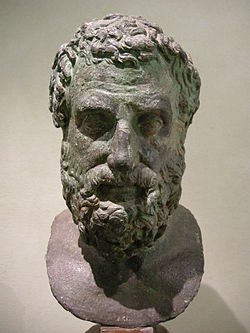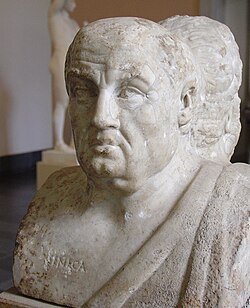Greek
Comedies


Ancient Greek comedy is conventionally divided into three periods: Old, Middle and New Comedy. Old Comedy survives through the eleven extant plays of Aristophanes and New Comedy through two mostly extant works of Menander. While Old Comedy parodied contemporary Athenian politics, leaders, and institutions, New Comedy features average citizens and parodies the cultural practices of the time. Middle Comedy is largely lost, preserved only in short fragments. [1] [2] [3] [4]
Aristophanes
- The Acharnians (425 BC)
- The Knights (424 BC)
- The Clouds (423 BC)
- The Wasps (422 BC)
- Peace (421 BC)
- The Birds (414 BC)
- Lysistrata (411 BC)
- Thesmophoriazusae (411 BC)
- The Frogs (405 BC)
- Ecclesiazusae (392 BC)
- Wealth (388 BC)
Menander
Extensive fragments exist for another five plays: Aspis , Epitrepontes , Misoumenos , Perikeiromene and Sikyonioi .
Tragedies



Ancient Greek tragedies were most often based upon myths from the oral traditions, exploring human nature, fate, and the intervention of the gods. They evoke catharsis in the audience, a process through which the audience experiences pity and fear, and through that emotional engagement, purges these emotions. Greek tragedy survives through the works of Aeschylus, Sophocles, and Euripides. [5] [6] [7] [8] [9]
Aeschylus
- The Persians (472 BC)
- Seven Against Thebes (467 BC)
- The Suppliants (463 BC)
- Agamemnon (458 BC)
- The Libation Bearers (458 BC)
- The Eumenides (458 BC)
Sophocles
- Ajax (442 BC)
- Antigone (441 BC)
- Women of Trachis (450–425 BC)
- Oedipus Rex (429 BC)
- Electra (420–414 BC)
- Philoctetes (409 BC)
- Oedipus at Colonus (406 BC)
Euripides
- Alcestis (438 BC)
- Medea (431 BC)
- Children of Heracles (430 BC)
- Hippolytus (428 BC)
- Andromache (425 BC)
- Hecuba (424 BC)
- The Suppliants (423 BC)
- Electra (420 BC)
- Herakles (416 BC)
- The Trojan Women (415 BC)
- Iphigenia in Tauris (414 BC)
- Ion (413 BC)
- Helen (412 BC)
- The Phoenician Women (410 BC)
- Orestes (408 BC)
- Bacchae (406 BC)
- Iphigenia in Aulis (406 BC)
Extensive fragments exist for another play: Hypsipyle .
Other
- Prometheus Bound (479–424 BC) (attributed to Aeschylus, true author unknown)
- Rhesus (450–440 BC) (attributed to Euripides, true author unknown)
Satyr plays
Satyr plays feature mythological-heroic stories in a style of language similar to that of the tragedies, while sharing with comedy plots, titles, themes, characters, and happy endings. They feature a chorus of satyrs, with costumes that focus on the phallus, and use wordplay and sexual innuendos that do not occur in tragedy. The vast majority of satyr plays have been entirely lost: only one, by Euripides, survives complete. [10] [11] [12]
Sophocles
No satyr play by Sophocles survives complete. Extensive fragments exist for one: Ichneutae .
Euripides
- Cyclops (424–408 BC)
Mimes

Mimes were a popular, informal type of entertainment in which a small group of actors portrayed a short situation from everyday life in the lower levels of society, in a humorous or farcical manner. It concentrated on depiction of character and physical humor instead of plot, and use of sexual innuendos and obscene jokes were frequent. There are eight surviving mimes attributed to Herodas, and three of Theocritus' idylls have been described as "urban mimes", although more of his work seems influenced by this literary genre. [13] [14] [15] [16] [17]
Theocritus
- The Sorceresses (3rd century BC)
- The Love of Cynisca (3rd century BC)
- The Women at the Adonis-Festival (3rd century BC)
Herodas
- The Go-Between (3rd century BC)
- The Whoremonger (3rd century BC)
- The Schoolmaster (3rd century BC)
- The Woman Sacrificing to Asclepius (3rd century BC)
- The Jealous Woman (3rd century BC)
- The Gossiping Friends (3rd century BC)
- The Cobbler (3rd century BC)
- The Dream (3rd century BC)
Other
- Charition (2nd century) (based on Iphigenia in Tauris by Euripides, author unknown)
- Moicheutria (2nd century) (author unknown)


